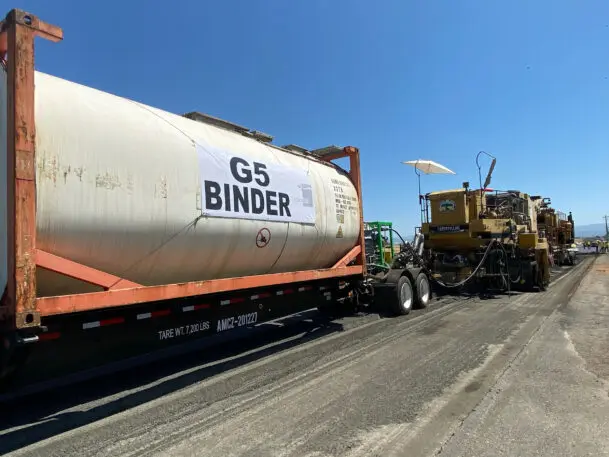A newly repaved stretch of highway in Oroville, California, looks like an ordinary road. But it’s the first highway in the country to be paved in part with recycled plastic—the equivalent of roughly 150,000 plastic bottles per mile of the three-lane road.
The change in materials makes the pavement stronger. “Traditional asphalt roads rely on rock for the strength of the road,” says Sean Weaver, president of TechniSoil, the startup that engineered the new type of pavement. “With our pavement, it relies on the matrix of a plastic binder for the strength, and the rock is simply a filler.” The new type of road resists potholes and cracking and can last two to three times longer than standard asphalt.

To repave a road, workers use equipment that grinds up the top layer of pavement, and then they mix that old pavement with the recycled plastic. California already recycles roads, but the normal process uses bitumen—sludge from oil refining—and the resulting road is weaker, so new material has to be added. Using current methods, repaving a single lane-mile can require bringing in 42 truckloads of new material and hauling out another 42 truckloads of waste. “The advantage with recycling in place is that we avoid all of the truck traffic in and out of the construction zone,” Weaver says. That eliminates the emissions from those trips and makes it faster to complete the job. “We can do this work very seamlessly at night.” The standard process requires heat, but the new process works cold, saving more energy.
The company is also working with Los Angeles to pilot plastic roads and will soon expand elsewhere in California as it works with CalTrans, the state transportation agency. In Oroville, where a 1,000-foot segment of highway was repaved, “we finished the first piece yesterday,” Weaver said on July 31. “And we already have a call slated for Monday to look at project number two and project number three. They are going at hyperspeed on this. California has some ambitious goals for recycling and environmental priorities.”
Recognize your brand’s excellence by applying to this year’s Brands That Matter Awards before the early-rate deadline, May 3.
